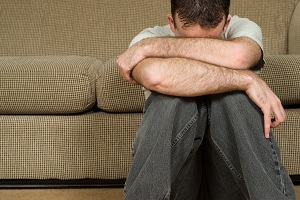Grief, Mourning, and Loss: Unhealthy Ways of Coping

I’ve been thinking about grief, mourning, and loss a lot lately. It shows up as a theme in my work as a psychotherapist all the time. I’ve also been studying the literature on methods of providing grief counseling and grief therapy. What I realize is that my sub-specialty in this area is not limited to working with individuals who have experienced the death of a loved one. It is more far-reaching than that. Judith Viorst wrote a wonderful book, Necessary Losses: The Loves, Illusions, Dependencies, and Impossible Expectations That All of Us Have to Give Up in Order to Grow, in the mid-1980s in which she described the losses we experience along the life cycle. It’s a must-read for people who are unfamiliar with it.
I would venture to say that most of the work we as psychotherapists and spiritual counselors do is about coping with loss. We help our clients grieve about their losses, whether it’s loss of youth, money, job, socioeconomic status, or friends. They need to be helped to grieve the loss of hopes and dreams. They even grieve the loss of fantasies and illusions, although much of this happens unconsciously. In this case, our job as psychotherapists and counselors is to help them recognize that they are in mourning and provide tools to cope. The idea is that grief takes up a lot of psychic space in our beings, and it is only by coming to terms with our losses that we create room for the new.
The focus of this article is how many people typically grieve. The ways—which are not healthy—include:
- deny
- become anxious or depressed, or a combination of both
- engage in risk-taking behavior such as drinking excessively and driving, compulsive spending, and sexually acting out
- become an abuser, a victim, or a combination of the two
- over-eat or under-eat, and other “overs” and “unders”
- become controlling
- hoard
These are just a few of the many ways people attempt to fill the space loss creates in their psyches and spirits. With methods such as these, the loss is not completely grieved or grieved at all. The feelings may even become worse, leading to a cycle of self-harming behavior.
So what predisposes someone to engage in the self-harming and ultimately unsatisfying behavior described above? There can be many factors, including low self-esteem, a history of untreated anxiety and depression, an inability to express feelings—especially difficult ones such as anger—and the lack of a support system. There are also more complex reasons involving one’s family of origin, including trauma in early childhood and the absence of a secure connection with early caregivers.
This sense of emptiness and lack of safety makes loss intolerable rather than simply painful, and it is this inability to tolerate it that leads to the behavior described above.
In addition to these internal factors, society in general and specific cultures in particular make grieving difficult. Part of this stems from our lack of recognition of the universality of loss, i.e., as something that permeates all aspects of life and isn’t just about death. In addition, we have become a culture of short-term fixes—the “just-get-over-it-and-move-on” philosophy. This puts pressure on individuals to minimize their sense of loss.
Finally, there is the over-arching reason grief is given short shrift. It makes many, if not most, people uncomfortable because it touches unhealed grief in themselves.
Next month, I will discuss some effective and healing ways to cope with grief and loss.
© Copyright 2007 - 2025 GoodTherapy.org. All rights reserved.
The preceding article was solely written by the author named above. Any views and opinions expressed are not necessarily shared by GoodTherapy.org.